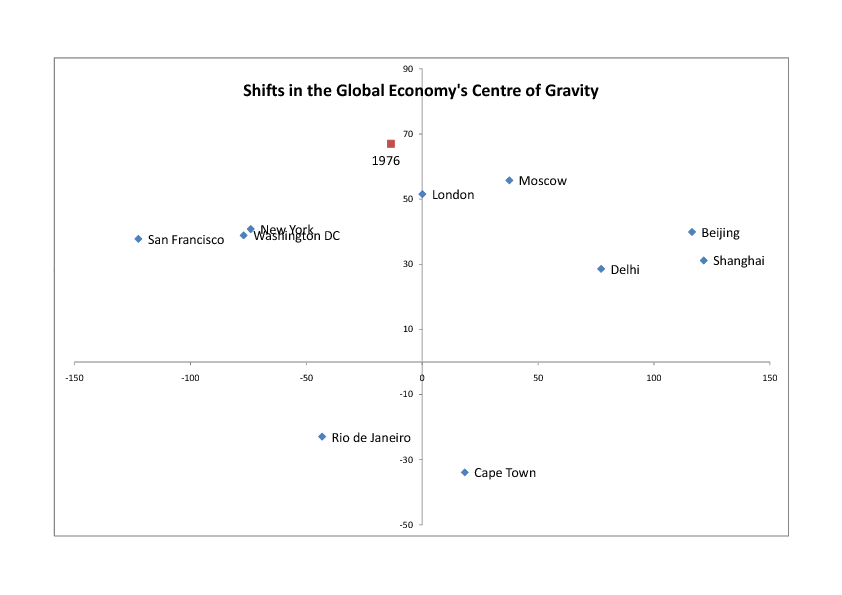Donaldson Tan

Don't ape the West, says NMP Calvin Cheng
Last month, Professor Danny Quah from the London School of Economics gave a talk on Asia in the Global Economic Crisis at the National University of Singapore. During the seminar, he revealed an animated chart that shows the World’s economic centre is shifting towards Asia.
In the animated chart, the position of the economic centre [depicted by the red square] is determined by the spatial distribution of the volume of economic activities. It is observed that the economic centre shifted towards Asia and the shifting rate increases at each occurrence of a financial crisis.
The chart affirms the notion that 21st century would be the Asian century. Asia has been a centre of attention due to rapid growth over the past decades. The economic progress achieved by Asia in the fifty years has been the fastest in human history. The Japanese example of rapid growth in the 1960s and 1970s was followed in rapid succession by several other Asian countries such as Singapore, Malaysia, Indonesia, Thailand, South Korea and Taiwan.
China registers an average growth rate of about 9 percent per year since 1980. India, once considered as a sluggard in Asia, is now also displaying a growth momentum of about 6 percent annually over the past two decades. Catching up with the developed world in per capita income is no longer deemed an impossible target.

The World's economic centre shift towards Asia (Credit: Prof. Danny Quah, London School of Economics)
Yet the catching-up game is not necessarily an anti-Western one. Was it not cooperation with Western investors and adopting best practices from the West that led to the modernisation of Singapore? As a gateway to Asia, Singapore provides a base in Asia for the West to reach out while Western investors set up factories and offices in Singapore that provide opportunities for employment and upward social mobility.
In a parliamentary speech last week, Nominated MP Calvin Cheng pointed out that it is a common misconception that imitation of the West is the same as being global and modern. This would indeed be the case if modernisation is narrowly defined as catching-up. He went on to say that there is no point to try to be the New York of the East. If the original is so easily reachable, then there is no attraction in the replica.
Moreover, against the rising Asian tide in the international political economy, Singapore appears to be suffering from a colonial hangover. However, this is but a manifestation that Singapore has reached an inflexion point as a modern city-state. Modernisation is not just about catching-up, but rather adopting and originating best practices, promoting and exporting culture. If Singapore’s catching-up efforts were not anti-Western, then the future modernisation of Singapore must be post-Western.
In a post-Western Singapore, there is no such thing as alternative knowledge to Western know-how – either it is knowledge or it is not. More importantly, if it is knowledge, then it is matter of verifiability, reason, rationality and defensibility. This means in the process of originating and exporting, knowledge, ideas and new practices are subjected to scrutiny; rejection is not avoidable.
It is not as if Singapore has never seen any rejection in its attempts to be post-Western. The most notable example was the promotion of Asian Values, which was first mooted publicly at the 1993 World Conference on Human Rights by the then Senior Minister Lee Kuan Yew. Proponents of Asian Values support authoritarianism and reject political pluralism. They call for the deference to central authority while they reject a supposedly Western tradition of liberalism.
However, it is by no means clear whether Confucius was more authoritarian than Aristotle. Aristotle wrote much in support for the personal freedom in that personal freedom is important and it should be guaranteed for people who “matter” in a good society. Even in society stratified by class, freedom could be seen of great value for the privileged few, such as the Mandarins, in much the same way freedom is valued by non-slave men in corresponding Greek conception of a good society.
While it is said that libertarianism is a development from John Locke‘s liberalism, libertarian ideas are in fact found in the writings of Chinese philosophers Lao Tze (老子) and Zhuang Tze (莊子), whose collective works pre-date John Locke by approximately 2000 years. On the other hand, laissez-faire capitalism was observed in the Ming and Song dynasties where state enterprises were abolished by the Chinese emperor and were never reinstated.
The point being is that the East-West dichotomy is a social construction. Great ideas, values and best practices will stand the test of time regardless of its origin and it will find acceptance beyond the geographical region of its origin. This acceptance will manifest in terms of culture whether it is at the workplace, leisure grounds and during intellectual discourse.

Don’t ape the West & the East blindly!
How’s about rejecting the East as much as we’re rejecting the West. We’re not really there either – and there’s loads of stuff from there that’s excess baggage as well. Like our royal family, for instance. And crony capitalism.
There are several types of knowledge in a broader sense: academic, implied, abstract and novel. The latter is stil a challenge for Singapore and will continue to remain so while questioning the othordox is forbidden.
glad to be one of many visitants on this awesome site : D.